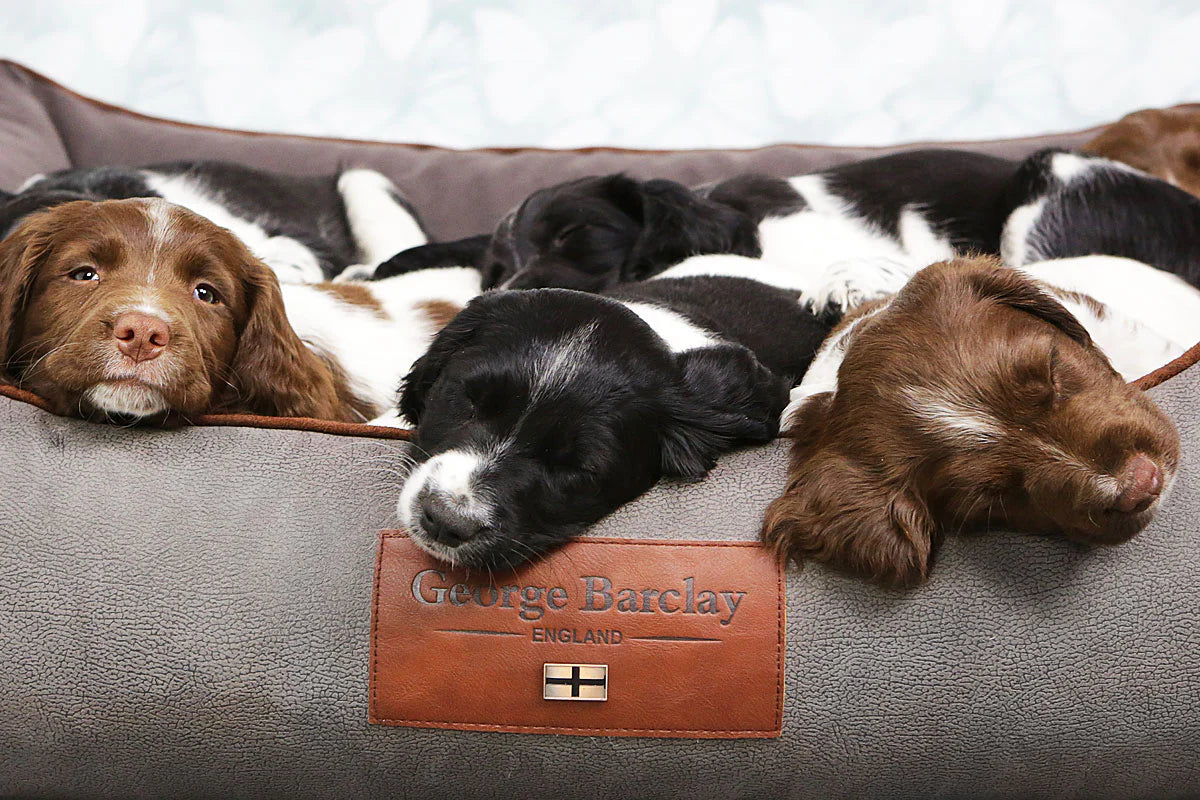Ever look at your dog sleeping and feel just a little envy? They feel tired, they take a nap. They go for a walk, they take a nap. Sometimes, it seems that all they do is sleep - usually when you are not sleeping! We take a look at how much sleep dogs need and give you the facts including:
- Puppies can sleep around 17 hours a day
- Adult dogs need between 12-14 hours sleep in a 24 hour period
- Why you should let sleeping dogs lie - you don’t want to startle them
- Why dogs twitch and make noises in their sleep - they’re probably just dreaming
- Dog’s need the right sleeping environment and it’s up to you to create that safe, secure space for them within your home
That’s the short version. To discover more about how much sleep dogs need, carry on reading, below.
Article contents:
- How much sleep do puppies need?
- How much sleep do adult dogs need?
- Creating the right sleep environment
How much sleep do puppies need?
Before a dog reaches adulthood, they require more sleep while they are growing and developing. In fact, puppies will sleep on average for 17 hours a day. That’s a lot of sleep! One of the most entertaining times of the day with a pup is the witching hour, just before they crash out for the night. Often, this is around 7pm when they suddenly get a burst of energy - affectionately known as the Zoomies. For those that don’t recognise it, it can be a little startling. Especially, when they have so much energy when you want them to sleep. Rest assured, in most cases they will crash and burn and sleep nicely for the night.
When they don’t sleep
Frustratingly, some puppies won’t sleep when they need them to - usually when you are trying to sleep! If you have just bought home a new puppy, you may be crate training to try and establish boundaries and a good sleeping routine. Of course, when removing a pup from their littermates and popping them in a strange new home, they are going to be a little unsettled and some puppies will howl for hours trying to get your attention. After a few days they should settle (as long as you don’t keep going to them in the night) and before you know it the house will be sleeping soundly again.
Establishing a routine
At the new puppy stage, or when bringing home a new adult dog, it is so important to establish a routine. A bed is an important part of this and the space allocated for sleeping. Getting into a routine, and your dog understanding where their bed is, is an important part of the sleep routine and ensuring that they adapt to your routine and habits.
How much sleep do adult dogs need?
Adult dogs don’t require as much sleep as puppies but they often sleep more than humans. An adult dog will usually sleep for around 12-14 hours in a 24 hour period - that’s approximately 50% of the day. They will break this down into naps and then their main nighttime sleep. Once a routine is established, they become creatures of habit and their nap times will be fairly predictable - only altered by change in walking patterns or more exercise than usual.
Why do dogs twitch in their sleep?
You may notice some peculiar traits when your dog is sleeping. Sometimes they can be quite cute - other times, you may get a little concerned. When your dog is sleeping, they are actually processing the information and experiences from the day. Twitching is thought to be related to the active dreams cycle. According to studies, it is believed that dogs will dream on average every 20 minutes for about a minute at a time. This is thought to vary according to the size of the dog - a large dog's dreams will be spaced further apart and last longer than a smaller dog for example.
Waking a sleeping dog
You may be wondering ‘should i wake a sleeping dog?’ and the answer is you are best off leaving them unless you are concerned about the movement they are making. If they are twitching in their sleep, they could be having a bad dream - if you wake them they may feel threatened if startled and scared. If you do feel the need to wake them, instead you should call their name gently. You’ve probably heard the saying ‘let sleeping dogs lie’ so try and leave them to it unless concerned.
Creating the right sleep environment
To ensure that your dog feels safe, warm, comfortable and able to sleep soundly, you must create the right sleep environment and routine. The dog must understand that their bed is their bed. The right bed is a critical part of this process and you should choose one that is right for the size, age and breed of your dog, and that suits their sleeping habits and preferences. You can discover more about the various dog beds and select the best one for your dog if required.
Consider where you place the dog bed - does it need to be close to you, or is there a specific area of the house that you want the dog to sleep? Make sure it isn’t in direct sunlight that is going to keep them awake, or close to draughty doors or windows. Dog’s like to feel secure and protected - often they will sleep below a table, or in a recess - somewhere that is darker and feels more 'den-like’. If you can create the right space for your dog, it will be much easier for them to establish a sound sleeping routine which suits both you and them.


